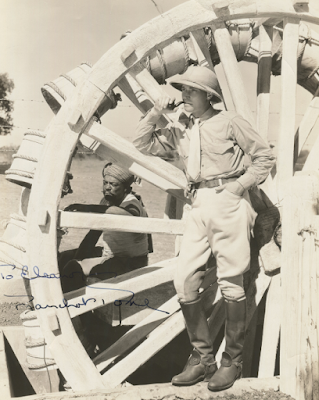 |
| Autographed photo (to Eleanor) of Franchot Tone on the set of The Lives of a Bengal Lancer. Source: my collection |
Well, the part had to be a man in balance. I considered this a love story between two guys; I don't mean a love story about homosexuals. Great affection and great love. And respect. When they gave me [Henry] Wilcoxon, I went in and protested. I said, "This man can be a first mate on a ship or a tough sergeant 'cause he's got a tough look about him. But he could not be a gentleman from the Blues." And it's much better to have a gentlemen instead of an Englishman. For balance. I said I wanted Franchot Tone and they said he was at M-G-M and he wasn't an Englishman and I had to use Wilcoxon...I started to work and I tried to get the balance in this stuff and I worked like hell with Wilcoxon, trying to get him a little softer, a little more gentle, more affable, tried to get him to be a gentleman...About a month into filming the picture, Hathaway knew that Wilcoxon was the wrong fit. He went to Manny Cohen and said that if Wilcoxon wasn't out, then Henry himself would quit the picture. Hathaway felt his future career as a director hinged on this moment and he was willing to abandon the project if his wishes were not met. He told Cohen that he wanted Franchot Tone for the part. A meeting was held with the studio's lawyers, Cohen, and Hathaway. Hathaway requested Franchot Tone. The studio said no and offered Cary Grant and then Ray Milland. Hathaway recalls he demanded:
"Why don't you get me the man I want? Get me Tone." They said, "He's in a picture." "I don't believe it. Call Metro." They called Metro and they said they'd talk to Tone about it. I said to send Tone over to talk to us. He came over and I talked to him about the whole thing and he said, "Fine, I'll do it." So I went back to work with Tone. You know that the picture would not have been the same without Tone. Would it?At this point, interviewer Polly Platt agrees and adds that "Tone is more interesting I think than Cooper." Hathaway responds, "And the fun he had with the Cooper character because he wasn't as classy as he was."
Platt then praises Hathaway for how the characters were set up and interacted with one another "and Tone does this wonderful look. Who could get away with that? Any other man?"
Hathaway responds, "If it was Wilcoxon, you'd have hated Wilcoxon. He's like the heavy."
Of course, Henry Wilcoxon starred in many of Cecil B. DeMille's films and went on to become a television actor and producer. We're fortunate that Hathaway pressed for Tone's involvement and that Franchot returned the interest despite M-G-M's leanings against it. Hathaway's insistence provided Franchot with one of the finest performances and films of his career. It was a role Franchot took pride in and would screen at home for his own enjoyment.
Source:
Hathaway, Henry and Polly Platt. Henry Hathaway. Scarecrow Press, 2001.

No comments:
Post a Comment